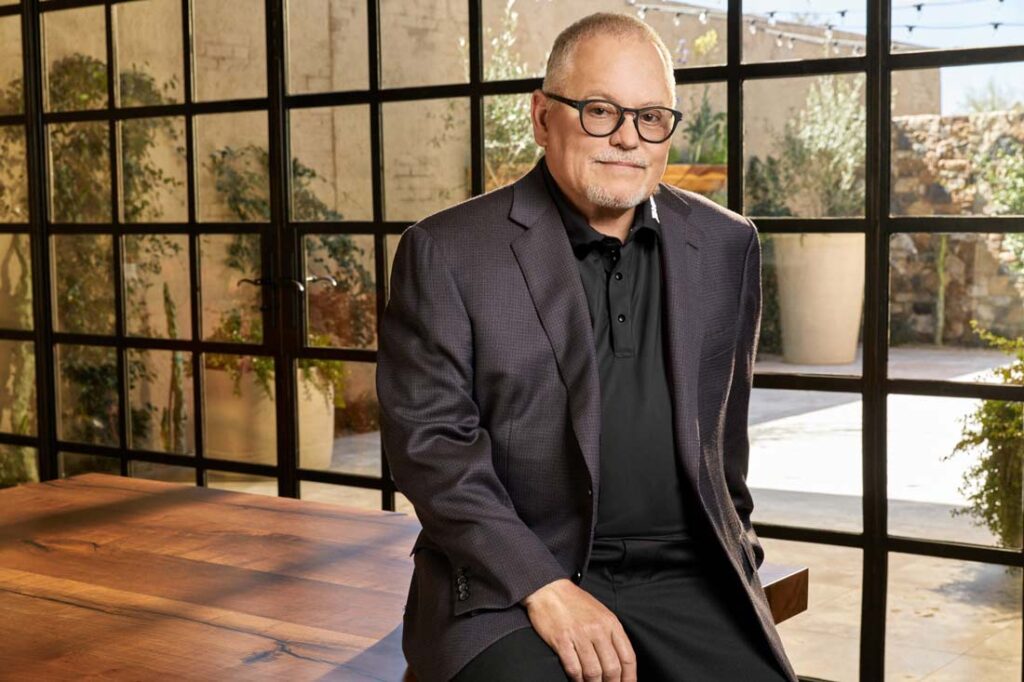When GoDaddy founder Bob Parsons was flunking out of high school in Baltimore in the late 1960s, no one guessed that he’d end up a tech billionaire.
Parsons readily admits that he was headed in the wrong direction as a kid. “When I was in school, I was terrible. Terrible,” he says with a chuckle. “I failed the fifth grade! And every year after that for me, whether I passed or failed, was a photo finish.”
In describing his journey from East Baltimore, Parsons says his neighborhood was a little rough: “If you got your car jacked, it would probably end up there.” And yet, he went on to amass a fortune as the founder of GoDaddy, the world’s largest domain name registrar. It’s quite a rags-to-riches tale, with a childhood informed by a father who, according to Parsons, “was a good guy but a compulsive gambler.”
Things didn’t get any better for Parsons as he got older, either. “When I was in high school, I discovered booze and the opposite sex; that’s never been known to be a combination that has encouraged good grades,” he says. “I was failing a number of subjects. I didn’t think I was going to graduate. So, me and my two buddies went down to the Marine Corps recruiter and I joined. I was 17.” That was in 1968.
The Marines Make the Man
Although being sent into the Vietnam War less than six months later and getting wounded in combat was the result, Parsons credits his two-year stint in the Marines with turning him into the 72-year-old man he is today. The Marine Corps awarded Parsons the Purple Heart medal for his service, and the experience went much deeper than his learning how to be a soldier.
“The thing I’m most proud of in my life is that I’m a United States Marine,” Parsons says. “I owe them everything I’ve ever accomplished. They taught me discipline; they taught me responsibility. And then they told me that I could accomplish far more than I ever thought I could. And that I had a right to be proud. All those things culminated in me being a totally different guy when I came out of the Marine Corps than the guy that went in.”
So much so that the former “D” student went on to graduate magna cum laude from University of Baltimore (using the GI Bill) and began his journey toward a previously unimagined level of business successes. It started there in the 1970s with a college class called “Introduction to Data Processing” and evolved to Parsons teaching himself how to write code “as a hobby,” which it turned out he had quite a knack for doing. In 1984, when he “wrote the code for my first business partner technology, which became a computer software home money-management program,” it enabled him to start his first business, Parsons Technology.
Ten years later, he sold that company for $64 million and soon after launched Jomax Technologies, which morphed into GoDaddy. That sale cemented Parsons’ ascension into the billionaire entrepreneur’s club in 2011, when Parsons sold his majority stake with the company—a value of $2.3 billion. That financial freedom then allowed him to follow his true loves—golf and motorcycles—to found yet another business, YAM Worldwide, which currently encompasses PXG (Parsons Xtreme Golf), the Scottsdale National Golf Club, Harley-Davidson of Scottsdale, GO AZ Motorcycles and more.
Lessons Learned
Parsons pinpoints what he considers the key to understanding success, in both business and life.
“I think the most important thing is to first learn about worry. I think worry is a beast. And most of the time, we worry about things that might seem important today but tomorrow, a week from now or a year from now are pretty trivial—or never happened. And it certainly accomplishes nothing. All it does is make you miserable and hold you back. So, I never worry, ever. What I do is I do what’s in front of me, and then we’ll see what happens. I think that is one of the things that has really helped me.”
Bob Parsons’ 16 Rules for Success
That, along with the following list, comprises Parsons’ “16 Rules for Success,” which he shares on his website.
- Get out of and stay out of your comfort zone.
- Never give up.
- When you’re ready to quit, you’re closer than you think.
- When you’re worried, ask yourself what’s the worst that can happen—and embrace it.
- Focus on what you want to happen.
- Take things one day at a time.
- Always move forward.
- Be quick to decide.
- Measure everything you want to improve.
- Look closely at the areas you haven’t examined for a while.
- Pay attention to your competitors, but pay more attention to what you are doing.
- Never let anyone push you around.
- Never expect life to be fair.
- Solve your own problems.
- Don’t take yourself too seriously.
- There’s always a reason to smile.
Community Commitment
Following his 16 rules for success has made Parsons a billionaire with much to give. He and his wife, Renee, established The Bob & Renee Parsons Foundation in 2012, with the express goal “to reach low-income and underserved populations, marginalized communities and causes often overlooked or underfunded by mainstream philanthropy.”
In 2013, they publicly committed to donating at least half of their fortune and signed the Giving Pledge, the campaign founded by Bill Gates, Melinda French Gates and Warren Buffett to encourage the world’s wealthiest individuals and families to dedicate the majority of their wealth to charitable causes. The Parsons are on their way, having offered up $190 million to a variety of causes, focusing on “homelessness, medical care, at-risk youth, education and veterans’ support,” according to the foundation. And in keeping with their love of their community, they donate $1 million to organizations in the greater Phoenix area every 14 days.
“When you’re giving away money, you want to give it to causes where it’s going to make a difference. You’ve got to focus it narrow enough so that when you do, it does make a difference,” Parsons explains. “We’re aware of our community and we love it, and we just want to make it a better place.”
Meanwhile, Parsons has no intention of giving up business. He offers up one last tip to getting to the top: Do what you love, and depend on talented others for the rest.
“I’m almost certain that I’m going to retire right after I am cremated,” he jokes. “I love my PXG business, love it. That’s the business that has the most promise and where you’ll find me most days. The rest of my businesses, I have learned to delegate. But I also have learned to monitor, so I am involved in them all. I talk to the top managers in every business a couple of times a month. Most of them are incredibly competent and probably do a better job than I’d ever do.”
This article originally appeared in the July/August 2023 issue of SUCCESS magazine. Photo courtesy of PXG.






